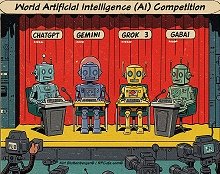Societal Influences
- See Full List of AI Topics -
Black Friday is a popular shopping
event that occurs on the day after Thanksgiving in the United States, which is typically
the fourth Thursday in November. It is often regarded as the unofficial beginning
of the Christmas holiday shopping season. On Black Friday, many retailers offer
significant discounts, special promotions, and doorbuster deals to attract shoppers,
both online and in physical stores.
The term "Black Friday" originated in the 1960s and was originally used to describe
the heavy and disruptive pedestrian and vehicle traffic that would occur on the
day after Thanksgiving. Over time, it came to represent the point at which retailers
would start turning a profit for the year, moving from "in the red" to "in the black."
The event has since evolved into a major shopping extravaganza, with people lining
up outside stores before dawn and increasingly participating in online shopping
as well. It's a time when many consumers seek to take advantage of the best deals
on a wide range of products, including electronics, clothing, toys, and more.
In recent years, some stores have extended their Black Friday sales into Thanksgiving
Day, a practice that has generated controversy and debate about the impact on retail
employees and the traditional holiday observance. Cyber Monday, which falls on the
Monday after Thanksgiving, has also become a significant online shopping event,
with many e-commerce sites offering discounts and promotions.
Black Friday (Stock Market)
Black Friday, in the context of the stock market crash, generally refers to the
events of September 24, 1869. It was not related to the modern Black Friday shopping
event, but rather, it was a significant event in the history of the U.S. stock market.
This particular Black Friday is often associated with the financial panic of 1869.
During this time, the United States was recovering from the economic turmoil
and financial instability that followed the Civil War. In September 1869, a group
of financiers, including Jay Gould and Jim Fisk, tried to corner the gold market
by buying as much gold as possible to drive up its price and manipulate the market
for their own gain. They believed that this would help them profit from a rise in
the price of gold.
Their actions and manipulative tactics created significant market volatility
and led to a sudden and dramatic increase in the price of gold. This speculative
frenzy came to a head on September 24, 1869, when the government intervened by selling
a large amount of gold to stabilize the market and break the corner that Gould and
Fisk had attempted to create.
The result was a sharp and rapid drop in the price of gold, causing panic and
a major financial crisis. Many investors and speculators faced significant losses.
This event is known as "Black Friday" in the context of financial markets and is
a notable historical example of market manipulation and its consequences.
 This content was generated by primarily
with the assistance of ChatGPT (OpenAI), and/or
Gemini (Google), and/or
Arya (GabAI), and/or Grok
(x.AI), and/or DeepSeek artificial intelligence
(AI) engines. Review was performed to help detect and correct any inaccuracies; however,
you are encouraged to verify the information yourself if it will be used for critical
applications. In all cases, multiple solicitations to the AI engine(s) was(were)
used to assimilate final content. Images and external hyperlinks have also been
added occasionally - especially on extensive treatises. Courts have ruled that AI-generated
content is not subject to copyright restrictions, but since I modify them, everything
here is protected by RF Cafe copyright. Many of the images are likewise generated
and modified. Your use of this data implies an agreement to hold totally harmless
Kirt Blattenberger, RF Cafe, and any and all of its assigns. Thank you. Here is
Gab AI in an iFrame. This content was generated by primarily
with the assistance of ChatGPT (OpenAI), and/or
Gemini (Google), and/or
Arya (GabAI), and/or Grok
(x.AI), and/or DeepSeek artificial intelligence
(AI) engines. Review was performed to help detect and correct any inaccuracies; however,
you are encouraged to verify the information yourself if it will be used for critical
applications. In all cases, multiple solicitations to the AI engine(s) was(were)
used to assimilate final content. Images and external hyperlinks have also been
added occasionally - especially on extensive treatises. Courts have ruled that AI-generated
content is not subject to copyright restrictions, but since I modify them, everything
here is protected by RF Cafe copyright. Many of the images are likewise generated
and modified. Your use of this data implies an agreement to hold totally harmless
Kirt Blattenberger, RF Cafe, and any and all of its assigns. Thank you. Here is
Gab AI in an iFrame.
AI Technical Trustability Update
While working on an update to my
RF Cafe Espresso Engineering Workbook project to add a couple calculators about
FM sidebands (available soon). The good news is that AI provided excellent VBA code
to generate a set of Bessel function
plots. The bad news is when I asked for a
table
showing at which modulation indices sidebands 0 (carrier) through 5 vanish,
none of the agents got it right. Some were really bad. The AI agents typically explain
their reason and method correctly, then go on to produces bad results. Even after
pointing out errors, subsequent results are still wrong. I do a lot of AI work
and see this often, even with subscribing to professional versions. I ultimately
generated the table myself. There is going to be a lot of inaccurate information
out there based on unverified AI queries, so beware.
Electronics & High Tech
Companies | Electronics &
Tech Publications | Electronics &
Tech Pioneers | Electronics &
Tech Principles |
Tech Standards Groups &
Industry Associations | Societal
Influences on Technology
|






